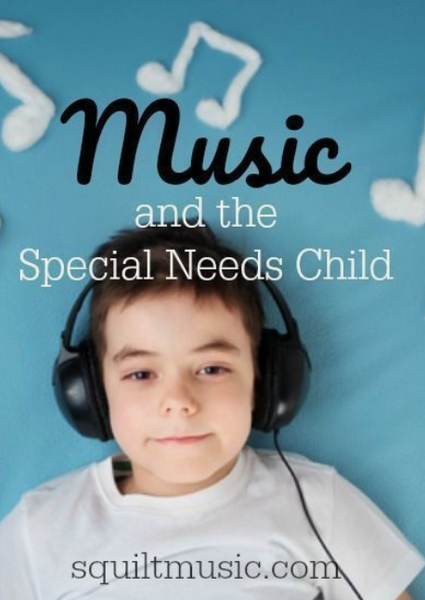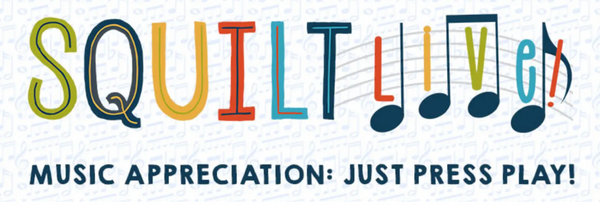Music and The Special Needs Child
Music is powerful - especially powerful for children.
If we exclude music from our children's education, we are depriving them of an entire WORLD of experiences, emotions, and creative processes.
Music can help children relate to others, express themselves, and improve reasoning skills. (I could go on and on - there are SO MANY benefits.)
Music is good for ALL CHILDREN - and especially good for children with special needs.

During my tenure in the elementary music classroom I taught thousands of students. These students were on all areas of the educational spectrum - from profoundly gifted to profoundly handicapped.
It was during those years I came to see the powerful effect music had on our special education children. It shouldn't be all that surprising, really. Music is the universal language. It appeals to each of us and stirs up our deepest emotions. It is a unique way to communicate our thoughts and feelings with and about the world.
Hans Christian Anderson once said:
"Where words fail, music speaks."
Why Music is Good for the Special Needs Child
1. Music Calms & Soothes
I vividly recall having a child who was extremely agitated most of the time. He would come into our second-grade music classroom and sit directly next to me on the piano bench.
That was my signal to start playing - normally I would play my favorite spiritual, "All Night All Day" - and this precious child would immediately become calm. It was as if his anxiety would melt away while I was playing the piano.
Consider what music can do for your own soul - then think about the gift it can be for a child who struggles with their emotions.
Simply playing beautiful music for a special needs child (no matter what their special need) can dramatically change their mood - and on a very practical level, this can make life a lot easier for both them AND you.
Try it:
Here are a few pieces you can try -- just play them for the child and see if you don't notice a difference:
The Swan - Camille Saint-Saens
Lullaby - Johannes Brahms
Air on the G String - Johann Sebastian Bach
2. Music Provides an Outlet for Expression (Physically & Emotionally)
Especially for children who struggle to communicate, music can provide them a vehicle for expression.
Give the child a simple rhythm band kit and let them experiment with the different instruments.
Many children are able to play a steady beat, come up with their own rhythm patterns, or copy what you are doing. The wonderful thing about this is that NOTHING IS WRONG. Creating and responding to music is subjective and non-threatening - easy success for all children.
What about marching, clapping, and dancing? I have fond memories of a severely autistic child who loved to circle dance with me. That smile plastered on his face will live in my heart forever.
Try it:
These pieces are fun to play for a child and see what response you will get -- just remember that sometimes it will be loud and not what you might deem beautiful - but that's OK. It's about the joy and expression for our children.
Tritsch Tratsch Polka - Johann Strauss
Russian Dance from The Nutcracker - Peter Ilyich Tchaikovsky
Slavonic Dance #8 - Antonin Dvorak
3. Music Can Motivate
Do your remember the Clean Up Song? I think millions of teachers and parents have used that song to motivate children to clean up!
Take that same principle and apply it to your special needs child.
Perhaps you want to motivate your child to get more gross motor activity -- a piece that inspires marching and large movements might do the trick. The same can apply for fine motor skills -- playing finger cymbals, triangles, and a host of other instruments can inspire a child in this area.
I've seen non verbal children play a particular pattern on a drum to communicate "yes" and "no".
Having a special music time can also be a wonderful reward for a desired behavior.
The list goes on and on --- there are so many ways you can use music to motivate the special needs child.
SQUILT and the Special Needs Child
When I authored the very first SQUILT volumes, I had ALL CHILDREN in mind. It is my prayer that these simple music appreciation volumes can be used with a variety of children.
Anyone can learn to appreciate music -- it's very non threatening, but highly rewarding.
Super Quiet UnInterrupted Listening Time exposes children to all the great pieces of music, and gives teaching strategies, movement suggestions, listening cues, and so much more.
Remember, I WAS a teacher of children with special needs. I've been there. (We used SQUILT at the end of every single music class.)
This music appreciation curriculum can work in your homeschool, co-op, or classroom - with special needs children.
- SQUILT is something everyone can do!
- SQUILT provides a variety of music -- from calming and soothing music to active and loud -- there is something for everyone.
- SQUILT allows you to dig deeper -- for the child that just can't rest until they know MORE. I offer tons of supplemental listening suggestions and ways to dive into the music beyond the scripted lesson.
In our live music appreciation lessons, I have heard from several parents of special needs children.
One mother of two children who have low-vision issues told me that our SQUILT LIVE! lessons are a time the girls always look forward to. In a recent lesson I asked the students to tell me what they heard as they were listening to Handel's Music From the Royal Fireworks. One of the low vision girls said she "heard bright colors".
Other parents report their special needs children being uniquely engaged through listening activities. We don't have to do anything special or make any modifications. Music does the work for us.
Beautiful.

Do you have experience with music and the special needs child?
Share it in the comments below!

